What the Hell Is the 'Military Version of Eminent Domain'?
Whatever it is, it can't be good.

President Donald Trump says he's willing to use "the military version of eminent domain" to build his proposed wall on the U.S.–Mexico border. It's not exactly clear what he means by that.
Addressing reporters from the Rose Garden today, Trump kept pushing for his ill-advised border wall. But what if Congress refuses to acquiesce to his demand for $5 billion in funding? Why, he'd declare a national emergency "and build [the wall] very quickly," he said.
Assuming, for the sake of argument, that he can do that, he'd run into another problem right away: The federal government owns less than one-third of the land on the southern border. The rest belongs to other entities, including states, Native American tribes, and private individuals. Most of the border land in Texas is private property.
Not a problem, said Trump: "You have to use eminent domain," he declared. That's when the government forces a property owner to sell, at a price set by the government. "If we had one person that wouldn't sell us…then we wouldn't be able to build proper border security because we'd have that big opening."
"I think it's a fair process," he added.
And what happens if Trump can't seize people's land with normal eminent domain? That's where the "military version" comes in:
Trump floats the idea of using "the military version of eminent domain" to immediately seize privately owned land along border to build the wall
— Josh Lederman (@JoshNBCNews) January 4, 2019
As explained, "[Lawsuits are] not going to hold [the wall] up because under the military version of eminent domain and under, actually, homeland security we can do it before we even start."
Hopefully it doesn't look anything like this:
Hey, look! It's "the military version of eminent domain"! pic.twitter.com/JQbk4eQHml
— Jesse Walker (@notjessewalker) January 4, 2019
In all seriousness, federal law does allow for military department secretaries to "acquire any interest in land" if "the acquisition is needed in the interest of national defense." But defining building a wall on the southern border as an issue of national defense is a stretch.
It's also worth noting that calling for a "military version of eminent domain" may not be the best way for Trump to sell his wall to the American people. Polls already show that a majority of Americans oppose the project. Further reducing the due process available to border property holders is unlikely to increase that number.
At least it made for some great Twitter reactions from Reps. Jim Hines (D–Conn.) and Justin Amash (R–Mich.), among others:
Can I use the "military version of eminent domain" to borrow my neighbor's snow shovel? @justinamash @RepThomasMassie ??
— Jim Himes (@jahimes) January 4, 2019
I am not aware of any "military version" of eminent domain. I am aware of executive overreach, and this sounds like it.
— Justin Amash (@justinamash) January 4, 2019
Today Trump claimed he will seize large swaths of land from private citizens at gunpoint and declare a "state of emergency" to build a wall without Congressional approval.
In the face of tyranny, Republicans are outraged … by a freshman Member of Congress using profanity.
— Renato Mariotti (@renato_mariotti) January 4, 2019
Also the "military version of eminent domain" would be… invasion.
— Jane Coaston (@cjane87) January 4, 2019
But the president's fondness for eminent domain in all of its forms should be no surprise. Trump has benefited from eminent domain for decades as a real estate developer. Why would he stop now?
